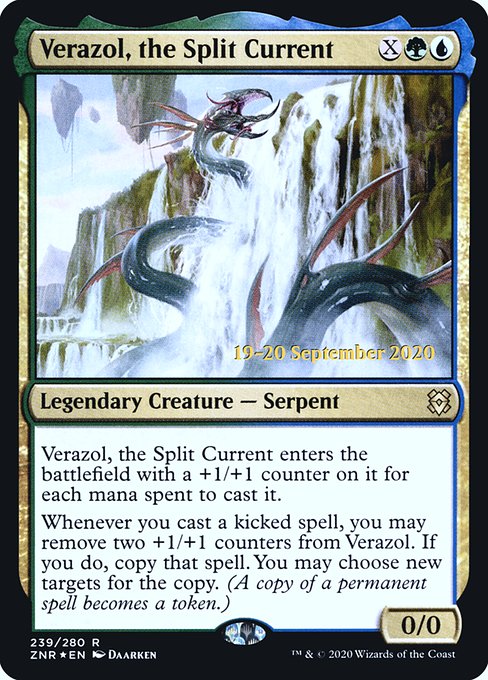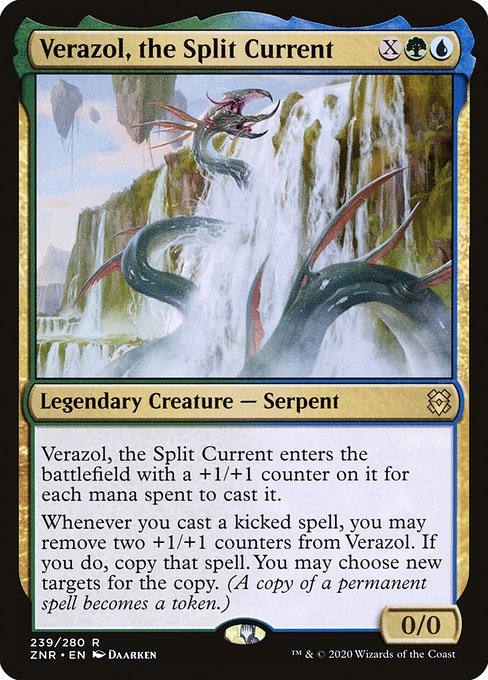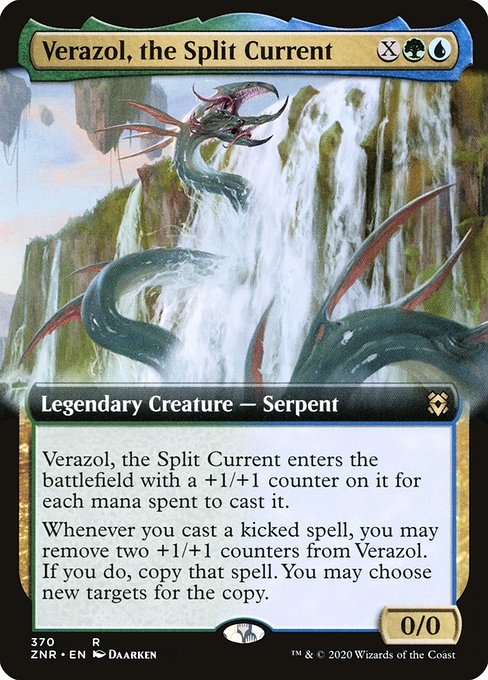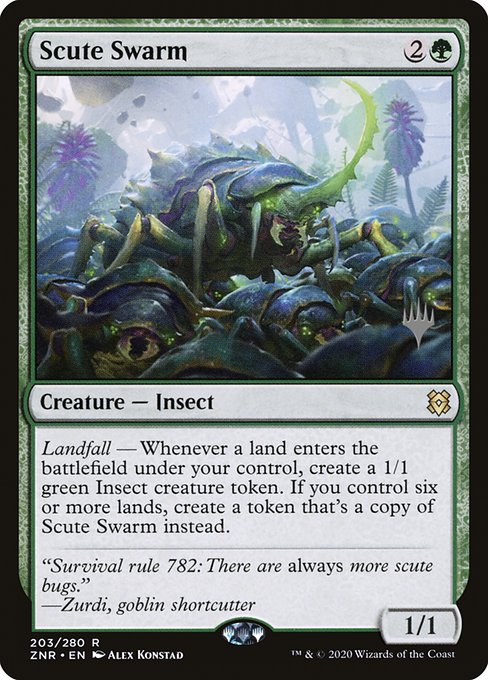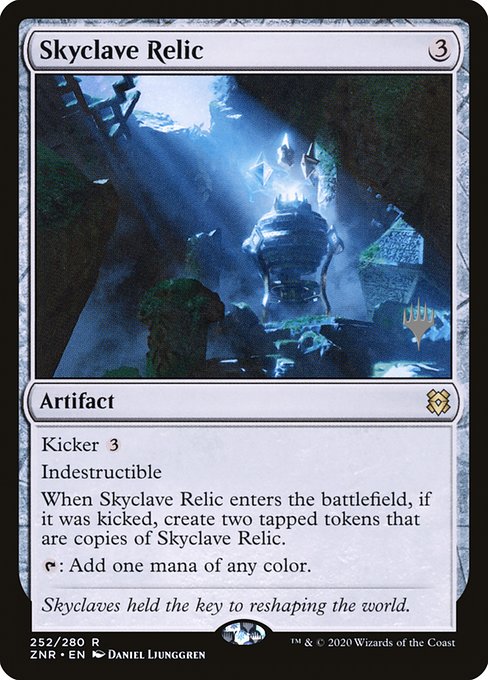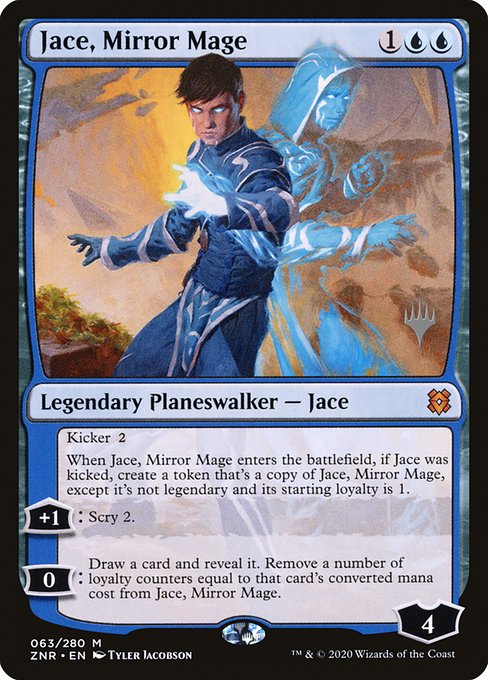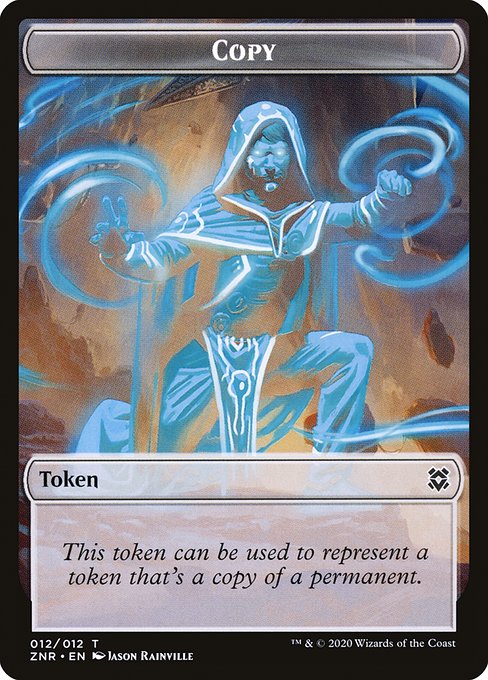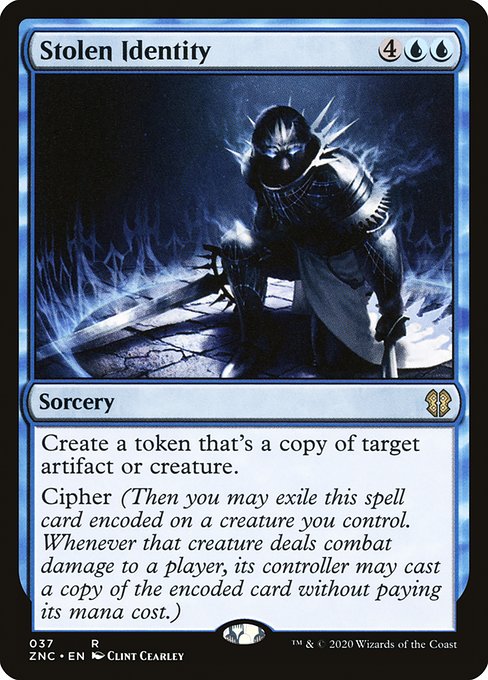Verazol, the Split Current
Legendary Creature — Serpent
Verazol, the Split Current enters the battlefield with a +1/+1 counter on it for each mana spent to cast it.
Whenever you cast a kicked spell, you may remove two +1/+1 counters from Verazol. If you do, copy that spell. You may choose new targets for the copy. (A copy of a permanent spell becomes a token.)
Whenever you cast a kicked spell, you may remove two +1/+1 counters from Verazol. If you do, copy that spell. You may choose new targets for the copy. (A copy of a permanent spell becomes a token.)
0/0
standard
future
historic
gladiator
pioneer
explorer
modern
legacy
pauper
vintage
penny
commander
brawl
alchemy
paupercommander
duel
oldschool
premodern
Rulings
The token that a resolving copy of a spell becomes isn’t said to have been “created.”
You can’t remove more than two counters as Verazol’s last ability resolves to copy the spell more than once. You can’t remove just one counter from it if it has only one. If Verazol leaves the battlefield while its last ability is on the stack, you can’t remove two +1/+1 counters from it at all.
Verazol’s last ability can copy any kicked spell, not just one with targets.
If Verazol enters the battlefield without being cast, then no mana was spent to cast it. It enters the battlefield without any +1/+1 counters. If no other effects are increasing its toughness at that time, it will be put into its owner’s graveyard as a state-based action.
The copy will have the same targets as the spell it’s copying unless you choose new ones. You may change any number of the targets, including all of them or none of them. The new targets must be legal.
If a permanent spell is copied, it’s put onto the battlefield as a token as the spell resolves rather than putting the copy of the spell onto the battlefield. The rules that apply to a permanent spell becoming a permanent apply to a copy of a spell becoming a token.
The amount of mana you spent to cast Verazol is usually equal to its converted mana cost, normally 2 plus the value chosen for X. However, you also include any additional costs you pay, including the “commander tax” in a Commander game.
If the spell that’s copied is modal (that is, it says “Choose one —” or the like), the copy will have the same mode or modes. You can’t choose different ones. This doesn’t apply to copying a permanent spell with a modal enters-the-battlefield ability.
If another creature enters the battlefield as a copy of Verazol, consider how much mana was spent to cast that creature to determine how many +1/+1 counters it enters with.
A copy is created even if the spell that caused Verazol’s last ability to trigger has been countered by the time that ability resolves. The copy resolves before the original spell.
The copy is created on the stack, so it’s not “cast.” Abilities that trigger when a player casts a spell won’t trigger.
For spells with in their mana costs, the copy has the same value of X.
You can’t choose to pay any additional costs for the copy. However, effects based on any additional costs that were paid for the original spell are copied as though those same costs were paid for the copy too. Most notably, the copy is also kicked.
You can’t remove more than two counters as Verazol’s last ability resolves to copy the spell more than once. You can’t remove just one counter from it if it has only one. If Verazol leaves the battlefield while its last ability is on the stack, you can’t remove two +1/+1 counters from it at all.
Verazol’s last ability can copy any kicked spell, not just one with targets.
If Verazol enters the battlefield without being cast, then no mana was spent to cast it. It enters the battlefield without any +1/+1 counters. If no other effects are increasing its toughness at that time, it will be put into its owner’s graveyard as a state-based action.
The copy will have the same targets as the spell it’s copying unless you choose new ones. You may change any number of the targets, including all of them or none of them. The new targets must be legal.
If a permanent spell is copied, it’s put onto the battlefield as a token as the spell resolves rather than putting the copy of the spell onto the battlefield. The rules that apply to a permanent spell becoming a permanent apply to a copy of a spell becoming a token.
The amount of mana you spent to cast Verazol is usually equal to its converted mana cost, normally 2 plus the value chosen for X. However, you also include any additional costs you pay, including the “commander tax” in a Commander game.
If the spell that’s copied is modal (that is, it says “Choose one —” or the like), the copy will have the same mode or modes. You can’t choose different ones. This doesn’t apply to copying a permanent spell with a modal enters-the-battlefield ability.
If another creature enters the battlefield as a copy of Verazol, consider how much mana was spent to cast that creature to determine how many +1/+1 counters it enters with.
A copy is created even if the spell that caused Verazol’s last ability to trigger has been countered by the time that ability resolves. The copy resolves before the original spell.
The copy is created on the stack, so it’s not “cast.” Abilities that trigger when a player casts a spell won’t trigger.
For spells with in their mana costs, the copy has the same value of X.
You can’t choose to pay any additional costs for the copy. However, effects based on any additional costs that were paid for the original spell are copied as though those same costs were paid for the copy too. Most notably, the copy is also kicked.
Rulings
The token that a resolving copy of a spell becomes isn’t said to have been “created.”
You can’t remove more than two counters as Verazol’s last ability resolves to copy the spell more than once. You can’t remove just one counter from it if it has only one. If Verazol leaves the battlefield while its last ability is on the stack, you can’t remove two +1/+1 counters from it at all.
Verazol’s last ability can copy any kicked spell, not just one with targets.
If Verazol enters the battlefield without being cast, then no mana was spent to cast it. It enters the battlefield without any +1/+1 counters. If no other effects are increasing its toughness at that time, it will be put into its owner’s graveyard as a state-based action.
The copy will have the same targets as the spell it’s copying unless you choose new ones. You may change any number of the targets, including all of them or none of them. The new targets must be legal.
If a permanent spell is copied, it’s put onto the battlefield as a token as the spell resolves rather than putting the copy of the spell onto the battlefield. The rules that apply to a permanent spell becoming a permanent apply to a copy of a spell becoming a token.
The amount of mana you spent to cast Verazol is usually equal to its converted mana cost, normally 2 plus the value chosen for X. However, you also include any additional costs you pay, including the “commander tax” in a Commander game.
If the spell that’s copied is modal (that is, it says “Choose one —” or the like), the copy will have the same mode or modes. You can’t choose different ones. This doesn’t apply to copying a permanent spell with a modal enters-the-battlefield ability.
If another creature enters the battlefield as a copy of Verazol, consider how much mana was spent to cast that creature to determine how many +1/+1 counters it enters with.
A copy is created even if the spell that caused Verazol’s last ability to trigger has been countered by the time that ability resolves. The copy resolves before the original spell.
The copy is created on the stack, so it’s not “cast.” Abilities that trigger when a player casts a spell won’t trigger.
For spells with in their mana costs, the copy has the same value of X.
You can’t choose to pay any additional costs for the copy. However, effects based on any additional costs that were paid for the original spell are copied as though those same costs were paid for the copy too. Most notably, the copy is also kicked.
You can’t remove more than two counters as Verazol’s last ability resolves to copy the spell more than once. You can’t remove just one counter from it if it has only one. If Verazol leaves the battlefield while its last ability is on the stack, you can’t remove two +1/+1 counters from it at all.
Verazol’s last ability can copy any kicked spell, not just one with targets.
If Verazol enters the battlefield without being cast, then no mana was spent to cast it. It enters the battlefield without any +1/+1 counters. If no other effects are increasing its toughness at that time, it will be put into its owner’s graveyard as a state-based action.
The copy will have the same targets as the spell it’s copying unless you choose new ones. You may change any number of the targets, including all of them or none of them. The new targets must be legal.
If a permanent spell is copied, it’s put onto the battlefield as a token as the spell resolves rather than putting the copy of the spell onto the battlefield. The rules that apply to a permanent spell becoming a permanent apply to a copy of a spell becoming a token.
The amount of mana you spent to cast Verazol is usually equal to its converted mana cost, normally 2 plus the value chosen for X. However, you also include any additional costs you pay, including the “commander tax” in a Commander game.
If the spell that’s copied is modal (that is, it says “Choose one —” or the like), the copy will have the same mode or modes. You can’t choose different ones. This doesn’t apply to copying a permanent spell with a modal enters-the-battlefield ability.
If another creature enters the battlefield as a copy of Verazol, consider how much mana was spent to cast that creature to determine how many +1/+1 counters it enters with.
A copy is created even if the spell that caused Verazol’s last ability to trigger has been countered by the time that ability resolves. The copy resolves before the original spell.
The copy is created on the stack, so it’s not “cast.” Abilities that trigger when a player casts a spell won’t trigger.
For spells with in their mana costs, the copy has the same value of X.
You can’t choose to pay any additional costs for the copy. However, effects based on any additional costs that were paid for the original spell are copied as though those same costs were paid for the copy too. Most notably, the copy is also kicked.
Your collection? Your decks?
Want to manage your collection and/or create decks?
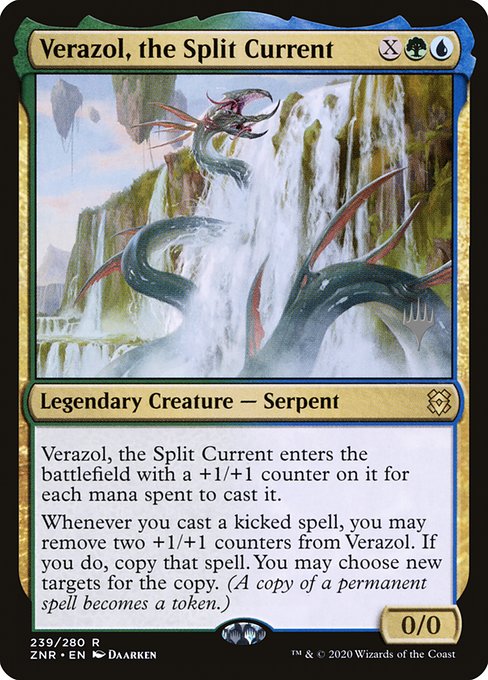

 0
0
 0.19€
0.19€
